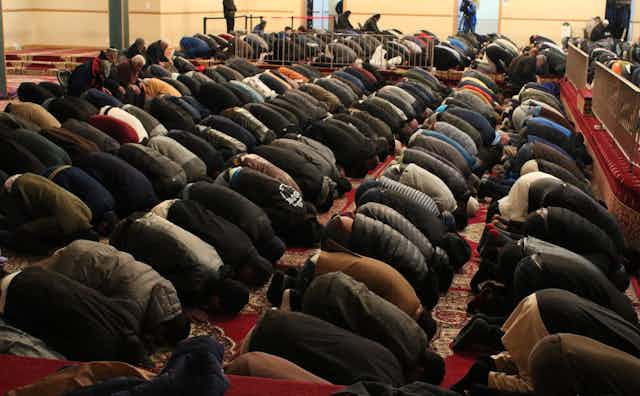Following the terror attack on two New Zealand mosques last week, many Muslim communities across the world gathered as usual for their most important weekly ritual – Friday prayers.
In the past few years, Muslims have been attacked and killed while praying, many times on a Friday. Worshippers have been targeted in countries such as Nigeria, Pakistan, Egypt, Afghanistan, Saudi Arabia, Libya, Iraq and Kuwait.
Muslims pray five times a day every day, but the most important prayer of the week is “jumah,” or the day of gathering, on Friday.
So why are Friday prayers so central to the Islamic faith?
The religious significance
I’m a scholar of Islam who researches and writes about Muslim ritual practices. The Qur’an invokes the importance of Friday as a sacred day of worship in a chapter called “Al-Jumah,” meaning the day of congregation, which is also the word for Friday in Arabic.
It states, “O you who believe! When you are called to congregational (Friday) prayer, hasten to the remembrance of God and leave off trade. That is better for you, if you but knew.”
Muslims believe Friday was chosen by God as a dedicated day of worship. In addition to the prayer itself, which is shorter than the usual midday prayers, Friday services include a sermon, usually given by a professional male Muslim clergy member in Muslim majority countries, but in the West, they are also given by a male lay community member.
Muslim men are required to attend Friday prayers as long as they not traveling, while women are given the option to attend, given their traditional role in the household when Islam was established.
In some countries, such as India, Pakistan and Tajikistan, women are not usually permitted to pray in mosques whereas in countries like Iran and Kenya, they attend in larger numbers. In almost all mosques, men and women pray separately. In some places women are behind the men in the same room and in others, women are in a different room or behind a barrier.
In the West, many women choose to attend prayer if they can get time away from work or other duties. In Los Angeles and elsewhere in North America and Europe, women lead their own Friday prayer services.
To prepare for prayers, Muslims bathe, apply perfume and brush their teeth to make their appearance pleasant to their fellow worshippers.
The Prophet Muhammad spoke of the value of praying in congregation rather than individually, promising spiritual rewards, such as answered prayers and forgiveness for one’s sins. Attending Friday prayers, the Prophet said, is equivalent to one entire year of praying and fasting alone.
A song by U.S. Muslim singer Raef Haggag describes how Muslims prepare and perform jumah prayers and their benefits. It provides a light but serious message about the significance of Friday prayers, especially for Western Muslims.
The tradition of prayer
Some Muslim majority countries, such as Egypt, Iran and Pakistan, include Friday as part of the weekend, with Saturday sometimes being a holiday, and Sunday being a regular workday.
On this day, many Muslims spend the day with their families, attend the prayer and also relax, although practices can vary. Commercial activities always continue after Friday prayers, but in Muslim-majority countries, most people get the day off.
Many people who do not have time to attend the mosque during the week will make a special effort to attend during Friday prayers.
In countries where the call to prayer is projected from loudspeakers, entire cities will be saturated with their sounds. Sermons too are often publicly broadcast, and in many cities, including in Western countries such as France, congregants overflow into the streets around mosques.
Crowded cities are often empty and quiet, up until the prayers, after which they are full of people enjoying their day off.
In the United States, Muslims have to receive special accommodation from their workplace to visit a nearby mosque. Some workplaces such as universities, hospitals or corporate offices, allow employees to organize their own Friday prayer on site.
As a religious ritual that goes back to the practice of the Prophet, Friday prayers hold a special place for Muslims.

